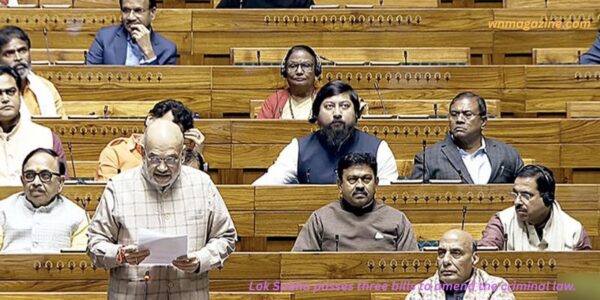Lok Sabha passes three bills to amend the criminal law.
2 min read
Lok Sabha passes three bills to amend the criminal law.
On Wednesday, the Lok Sabha successfully passed three pivotal bills, marking a comprehensive overhaul of India’s criminal laws. The bills in question are the Bhartiya Nyaya (Second) Sanhita, 2023, and the Bharatiya Nagarik Sakshya (Second) Bill, 2023. These legislative measures cover a spectrum of changes, including the decriminalization of homosexuality and adultery, along with an extension of the permissible duration of police custody from the current 15 days to a maximum of 90 days.
Expected to be enacted under the Indian Evidence Act of 1872, the Code of Criminal Procedure of 1973 (originally enacted in 1898), and the Indian Penal Code (IPC), 1860, these bills aim to indigenize laws originally instituted by the British colonial rulers. Union Home Minister Amit Shah, spearheading the bills, clarified that their objective is to rid the legal framework of colonial influences.
Also Read: Wellhealth Ayurvedic Health Tips
The government contends that specific provisions of the IPC, notably those relating to adultery, the criminalization of homosexuality, and sedition, which bear colonial imprints, have been excised. However, scrutiny of the fine print reveals a substitution of the term “rajdroh” with “deshdroh” for the crime of sedition, an act currently deemed illegal by a Supreme Court ruling.
During the House Bill debate, marked by conspicuous empty benches in the opposition block due to the suspension of 97 opposition members, Amit Shah vociferously defended the bill’s provisions. He emphasized the redefinition of terrorism and the alteration of the sedition definition, asserting that any act hostile to the country would face repercussions.
Shah seized the opportunity to criticize the Congress, pointing out that under Modi’s leadership, laws are being crafted in harmony with the spirit of the Constitution. He declared his pride in effecting the first changes to these laws in 150 years and highlighted the government’s commitment to fulfilling electoral promises.
The genesis of these bills dates back to the final day of Parliament’s monsoon session in August when they were introduced and referred to a standing committee. Chaired by BJP MP Brij Lal, the committee held nine meetings over six days in September and October. While the report included some changes and suggestions, it generally endorsed the laws. Opposition members, including Derek O’Brien of the TMC and P Chidambaram of the Congress, expressed discontent with the short consultation period and the selection of subject matter experts.
Reflecting on the NDA government’s accomplishments, Shah underscored the fulfillment of BJP’s election promises, including the removal of Articles 370 and 35-A. He reaffirmed the government’s commitment to eradicating terrorism, implementing a zero-tolerance policy, and providing security personnel unrestricted access.
Also Read: wellhealthorganic vitamin b12
Shah concluded by emphasizing that these laws were originally imposed by foreign rulers to perpetuate their control, characterizing them as instruments of subjugation. He provided a detailed account of modifications to the criminal justice laws, highlighting the expansion of the CrCP to 531 sections in the Bharatiya Nagarik Suraksha (Second) Sanhita, 2023, along with numerous amendments and additions to enhance legal efficacy.







